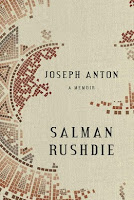Salman Rushdie, the Democratic World, and Iran in Joseph Anton | DIANA PAUL
As the world witnesses the unveiling of the deadly fangs of its attack on democracy, Iran’s war on Israel, it would be a useful intellectual exercise to re-read Salman Rushdie’s classic The Satanic Verses, which earned him a fatwa, from Iranian religious leadership. Rushdie recounts his experiences in Joseph Anton, a memoir, which was released in 2012 by Random House. In Joseph Anton Rushdie reminds us of the tragic aftermath of a brave commitment to the freedom of expression, his writing of the novel, when there is a total lack of tolerance.
It was Valentine's Day, 1989, when Salman Rushdie's life took an unexpected turn. A BBC journalist delivered the chilling news that he had been "sentenced to death" by the Ayatollah Khomeini for his novel, The Satanic Verses. Overnight, Rushdie became a hunted man, forced into hiding for over a decade.
.jpg) |
| Salman Rushdie |
Under the alias "Joseph Anton," a fusion of literary icons Joseph Conrad and Anton Chekhov, Rushdie embarked on a clandestine existence, constantly shifting from one safehouse to another. Imagine, living with armed policemen as your constant companions, deciding the boundaries of your life – where you can go, whom you can see, even when you can check your mail.
But life didn't stop. It went on in a distorted rhythm. Friends drifted in and out, children grew up in the shadow of fear, marriages strained under the weight of confinement. Governments vacillated between courage and political expediency, grappling with the complexities of standing up to extremist threats.
Rushdie's memoir, Joseph Anton, offers a raw, unfiltered account of his life during those tumultuous years. Penned in the third person, it's a narrative that feels at times detached, almost surreal. Yet, beneath the surface lies the harrowing reality of a man forced to confront mortality daily, grappling with questions of freedom of expression versus personal safety.
Throughout the memoir, Rushdie doesn't shy away from self-examination, exposing his flaws and vulnerabilities alongside the betrayals of others, even beloved literary figures like Roald Dahl. His story serves as a poignant reminder of the fragility of freedom and the price some pay for daring to challenge orthodoxy.
Reflecting on his childhood and upbringing, Rushdie explores themes of identity and belonging, finding strength in his differences and a determination to reclaim his narrative. The controversy surrounding The Satanic Verses stemmed from its exploration of religious themes, sparking debates about interpretation and the boundaries of artistic expression.
In the aftermath of the fatwa, Rushdie witnessed a troubling shift in Islamic discourse, from isolated extremism to a global anti-Western sentiment. Yet, amidst the chaos, he found solace in the generosity and support of friends, a testament to the resilience of the human spirit.
Joseph Anton is more than just a memoir; it's a testament to the enduring struggle for freedom in the face of tyranny. Rushdie's journey reminds us that the fight for expression is ongoing, with each generation tasked to defend the rights we often take for granted. As we navigate the complexities of our modern world, his story serves as a poignant reminder of the power of resilience and the indomitable human spirit.

.gif)
.png)


.png)
.png)
.png)
.png)
.png)
.png)
.png)


Comments
Post a Comment